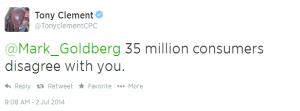#CASL: Clarifications are in order
The House of Commons Standing Committee on Industry, Science and Technology (INDU) has released its report [pdf, 4.3MB] following the statutory review of Canada’s Anti-Spam Legislation (CASL) and the Committee has made a number of recommendations to “ensure the Act continues ‘to promote the efficiency and adaptability of the Canadian economy.'”
Ever since its enactment, CASL’s main challenge remains to balance, on the one hand, restricting the transmission of unsolicited commercial electronic messages in order to limit the costs associated with such messages and protecting Canadians against spam, and, on the other, allowing individuals and organizations to promote their lawful activities. Meeting this challenge requires clear legislative action that does not lead to unintended consequences.
The report has a total of 13 recommendations, ranging from the trivial to far more substantive. Recommendations 1 and 13 deal with the name of the Act itself, recommending that the Act be called the “Electronic Commerce Protection Act” (ECPA) as contrasted with the name that rolls off no one’s tongue: “An Act to promote the efficiency and adaptability of the Canadian economy by regulating certain activities that discourage reliance on electronic means of carrying out commercial activities, and to amend the Canadian Radio-television and Telecommunications Commission Act, the Competition Act, the Personal Information Protection and Electronic Documents Act and the Telecommunications Act“. Catchy, right?
The bulk of the recommendations incorporate the phrase “unintended cost of compliance”, evidence that the message has been received: CASL has led to unintended costs for Canadian businesses which ultimately are borne by consumers.
Three of the recommendations target the CRTC: increasing education efforts; sharing information with law enforcement agencies; and, increase transparency in its investigations and determinations of penalties.
The INDU Committee is recommending changes, made clear from the title of its report, “Canada’s Anti-SPAM Legislation: Clarifications Are In Order.” The report concludes with a clear message to the Government:
While improving guidance and education should be a priority moving forward, it can only achieve so much. The Act and its regulations require clarifications to reduce the cost of compliance and better focus enforcement. Provisions defining CEM, consent, and “business-to-business” messages, among others, warrant the attention of the Government of Canada. The Government will be in a better position to assess the impact of the coming into force of the private right of action once these clarifications are implemented.
As longtime readers of this blog are aware [just use search word “CASL” to see], I agree. Clarifications are in order.


